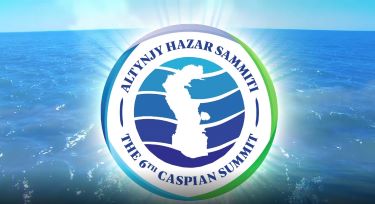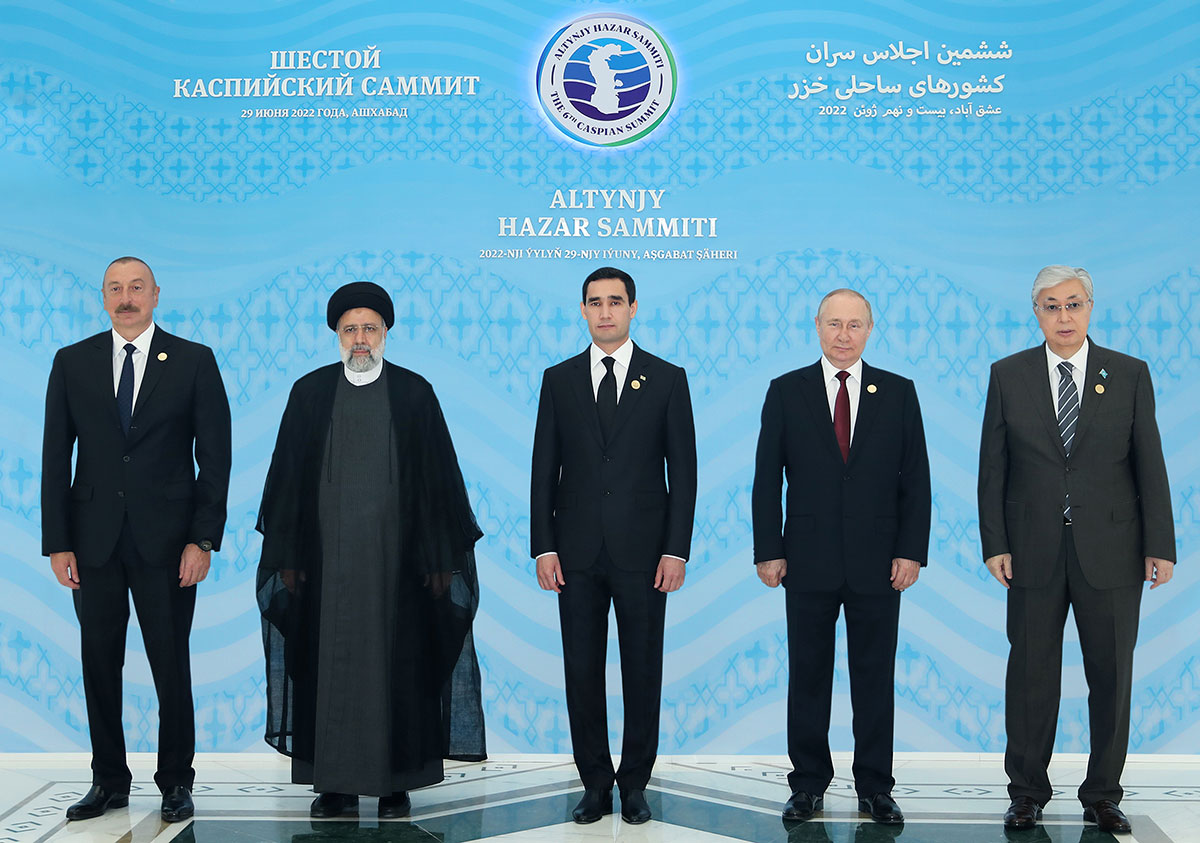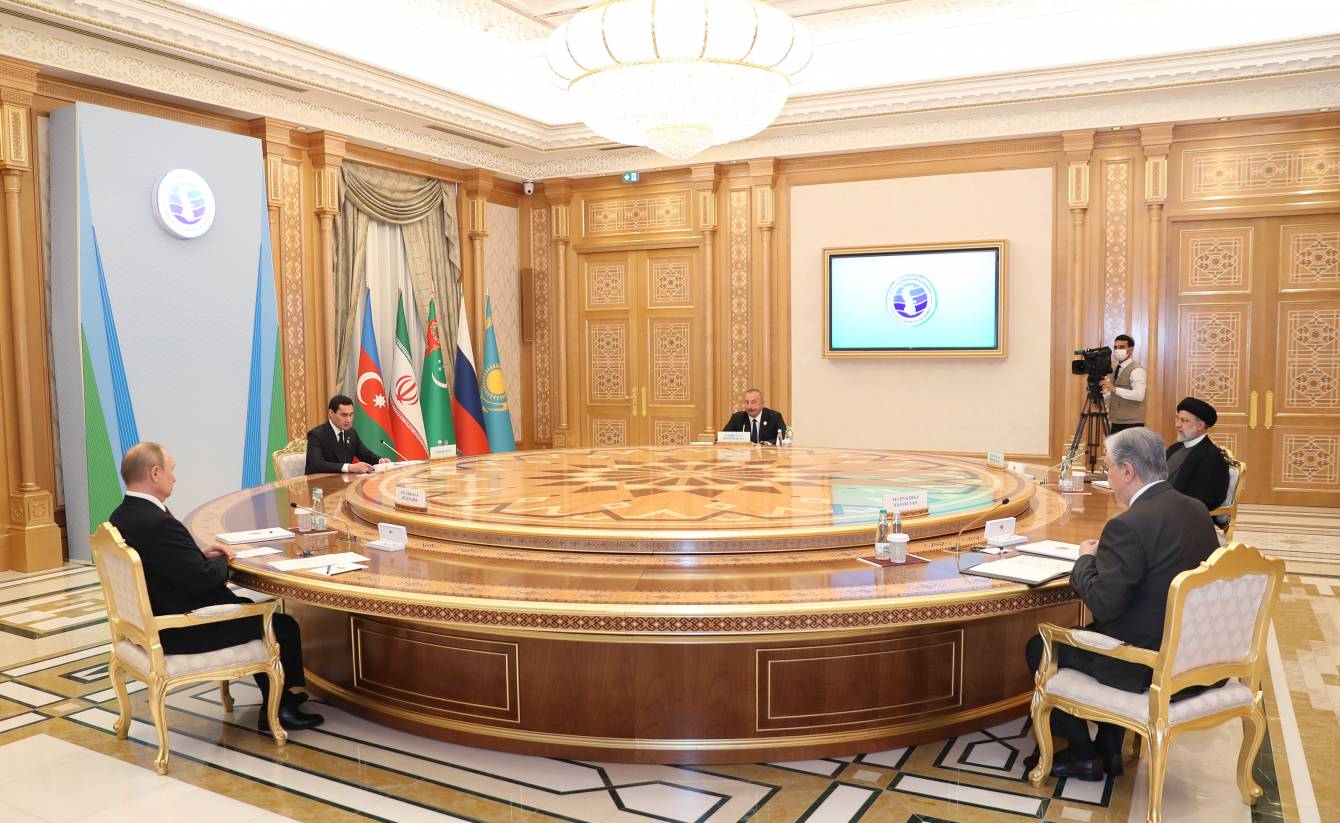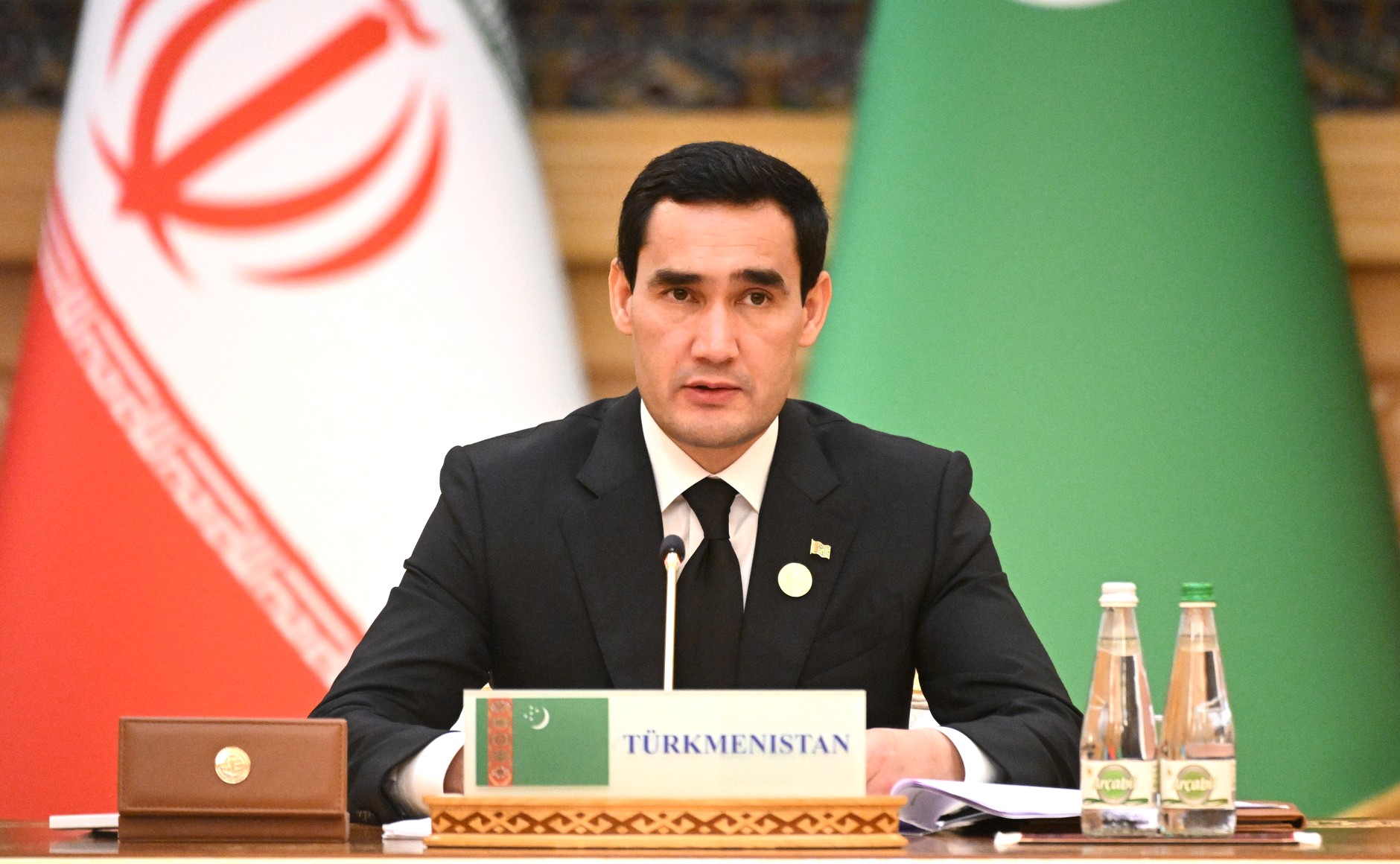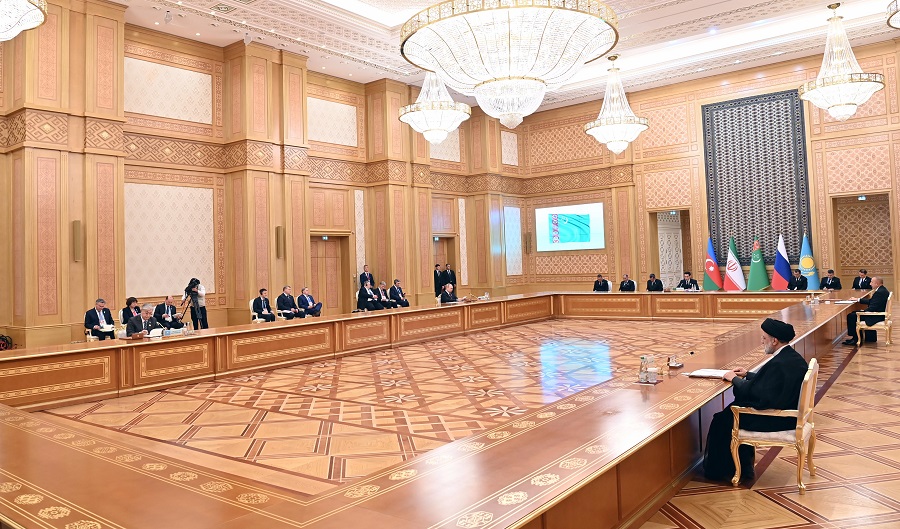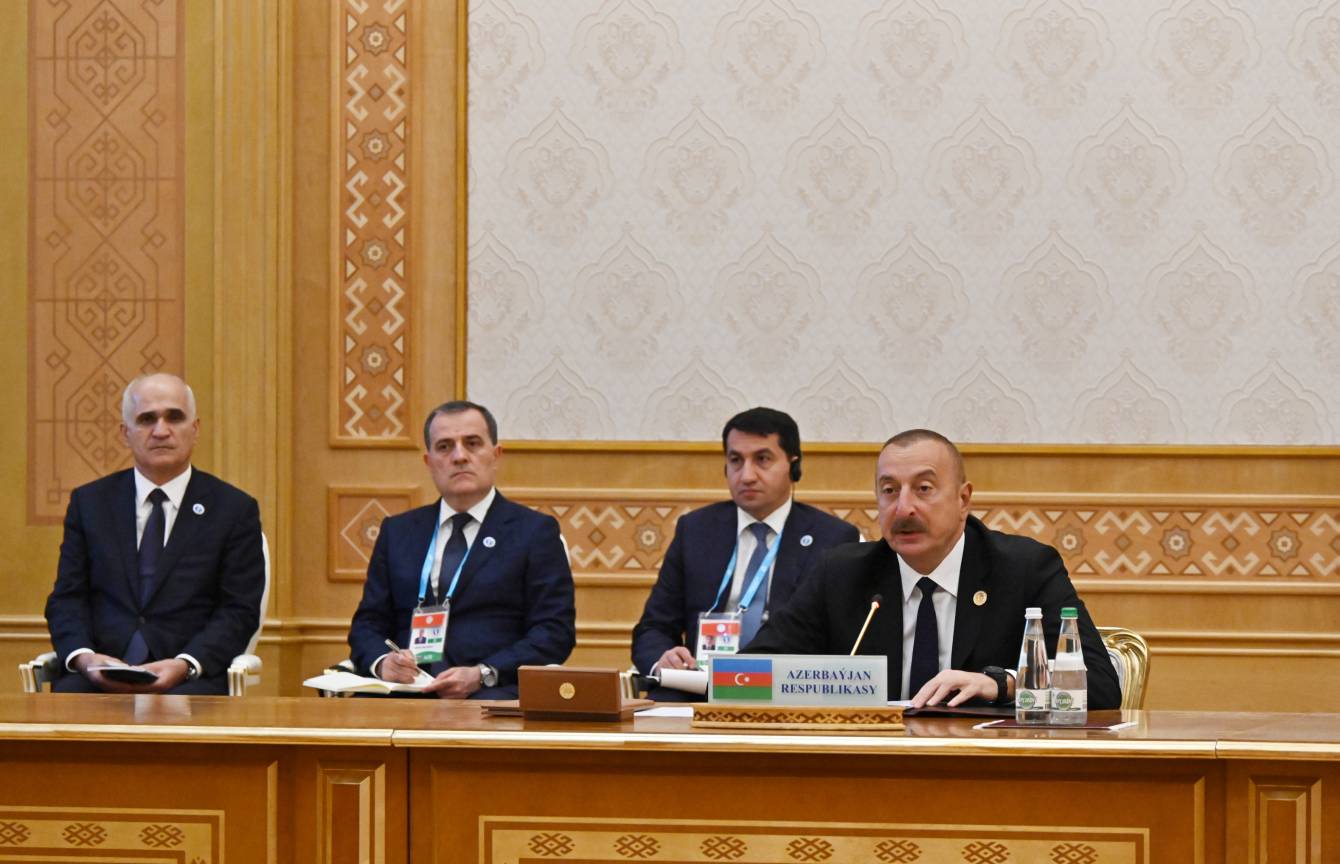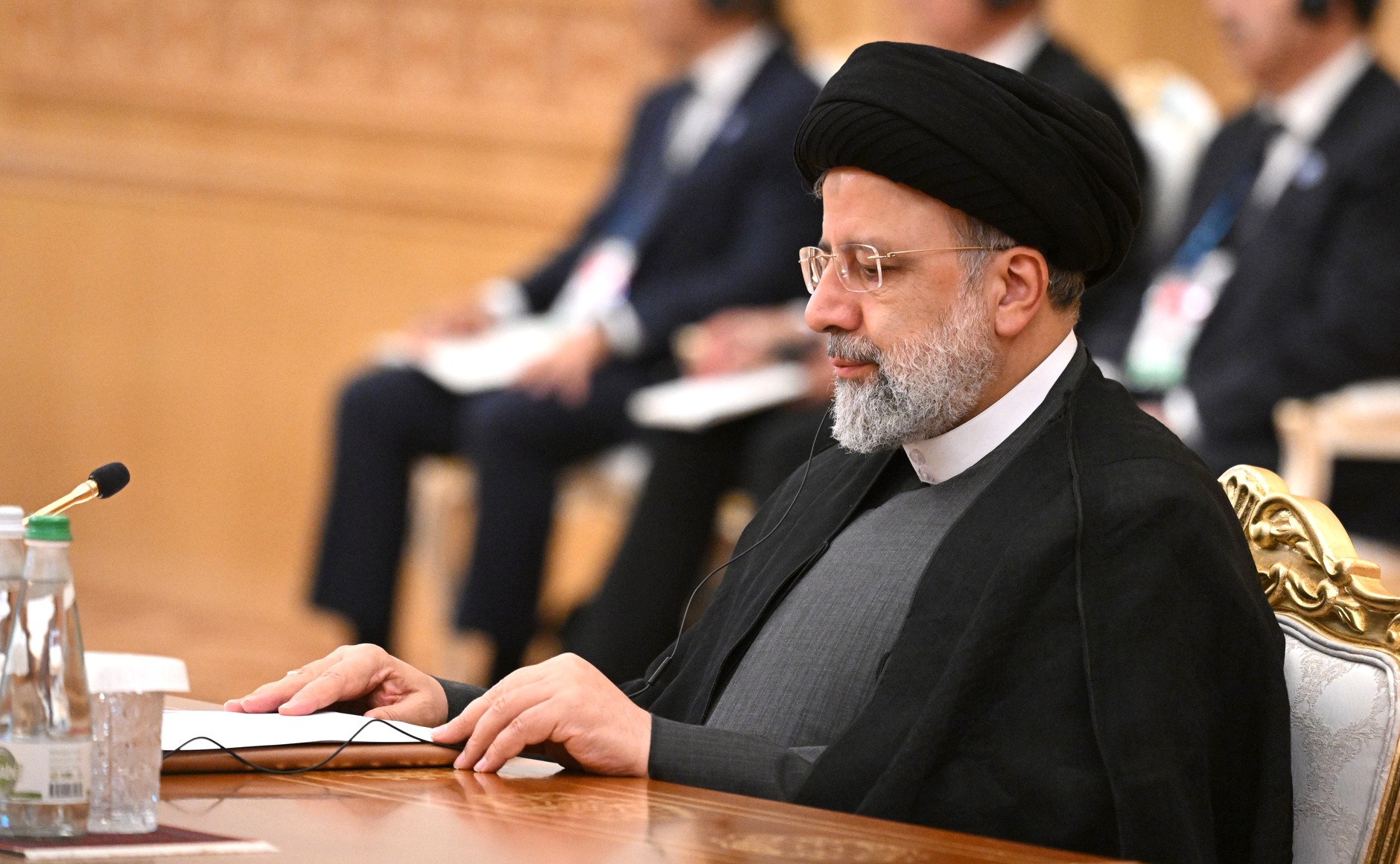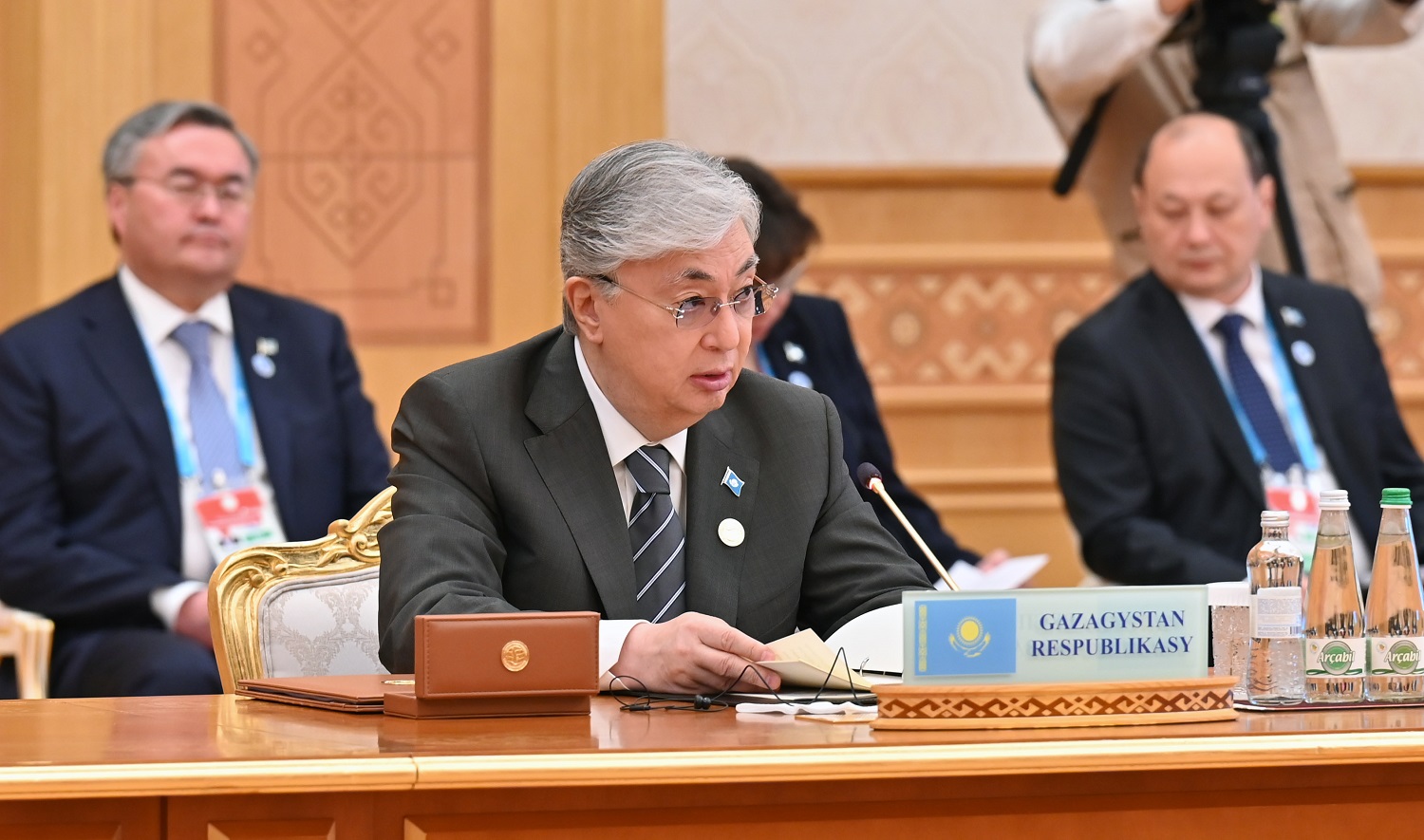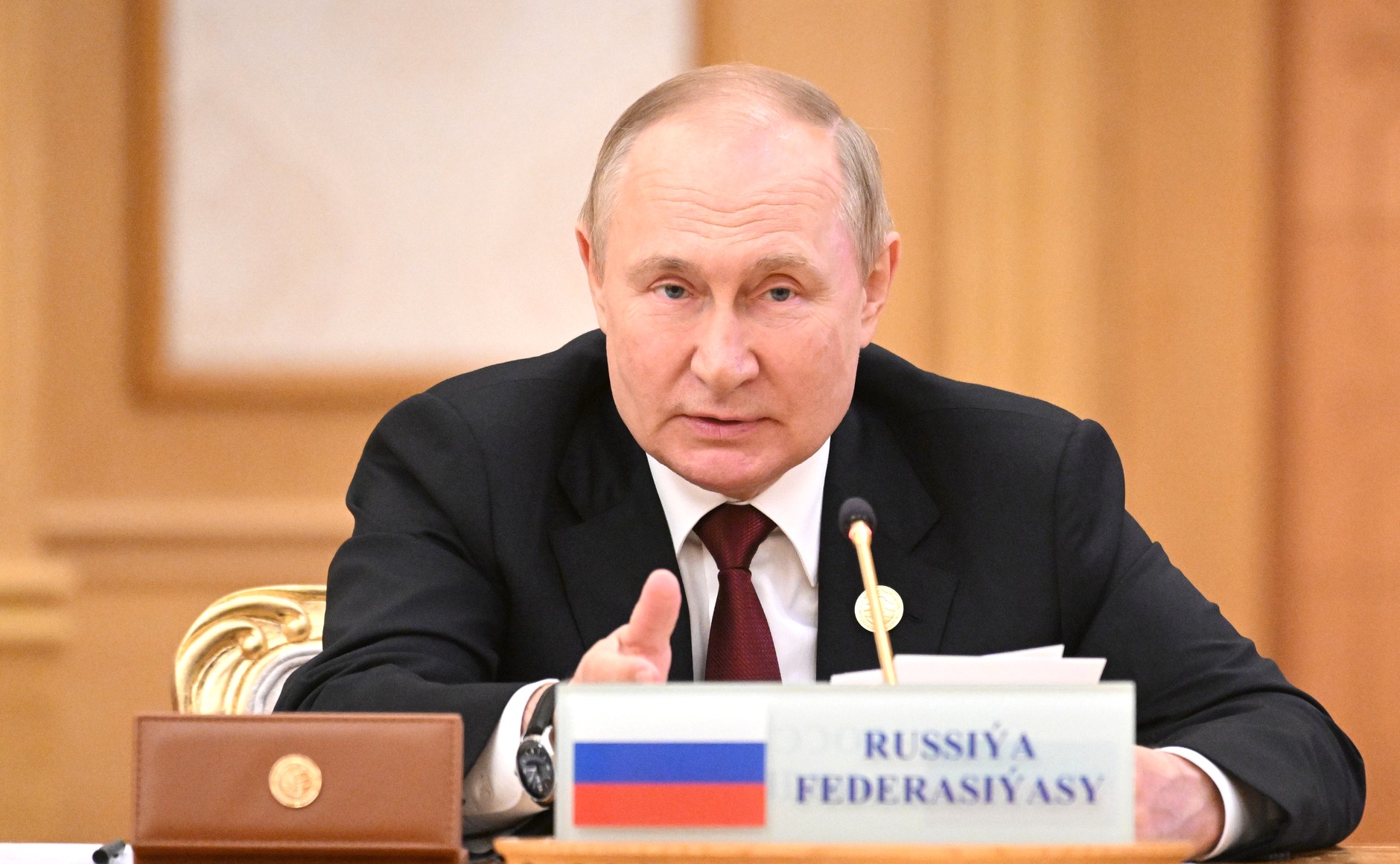nCa Report
On 29 June 2022, the Presidents of Turkmenistan Serdar Berdimuhamedov, Ilham Aliyev of Azerbaijan, Ebrahim Raisi of Iran, Kassym-Jomart Tokayev of Kazakhstan and Vladimir Putin of Russia met in Ashgabat for the 6th Summit of Heads of Caspian States.
The summit, held in narrow and expanded formats, discussed the issues of interaction between coastal countries and provided a platform for an exchange of views on urgent issues of international and regional agenda of mutual interest.
On the sidelines of the summit, the heads of the Caspian littoral states held a number of bilateral meetings.
The final Communique was adopted by the heads of states, which recognized the importance of the Convention on the Legal Status of the Caspian Sea and reaffirmed important guiding principles in the fields of navigation, security, research of biological resources, environment protection.
The Communique has instituted the foreign ministers’ meetings as coordinating mechanism for the finalizing and implementation of decisions, preparation of the agenda of the Caspian summits.
It was agreed that the next Caspian summit will take place in Iran.
Following the summit, a press statement was made by foreign minister of Turkmenistan. In honor of the heads of the Caspian states, the President of Turkmenistan hosted an official banquet.
Speech by President of Turkmenistan Serdar Berdimuhamedov at the Sixth Caspian Summit
Dear Heads of State! Dear members of the delegations! I cordially welcome the Presidents of the Republic of Azerbaijan, the Islamic Republic of Iran, the Republic of Kazakhstan, and the Russian Federation to Turkmenistan.
Thank you for accepting the invitation to participate in the sixth meeting of the heads of the Caspian states. We consider this as a confirmation of the commonality of our goals in the Caspian Sea, readiness to continue close partnership.
As you know, the First Caspian Summit was held in Ashgabat in April 2002. In fact, it was then that the foundation was laid for long-term systemic cooperation across the entire spectrum of the Caspian agenda.
20 years have passed since then, and we can say today that a new form of political interaction in the Caspian region at the highest state level has proved to be in demand and has taken place as a decisive factor in the unity of the goals and interests of the littoral countries in the name of peace, development and prosperity of our peoples.
The subsequent summits held in Tehran, Baku, Astrakhan and Aktau also became key for the Caspian, gave powerful positive impulses to the substantive joint activities of the states in the various spheres of the Caspian dialogue. We can truly say that the credit for this belongs to all five States, each of the countries has made an invaluable contribution to the formation of the architecture of relations in the region.
A lot has been done over the past period. Our main common success was the signing of the Convention on the Legal Status of the Caspian Sea in Aktau in 2018, and I would like to take this opportunity to express my deep gratitude to all the Caspian States for their constructiveness, understanding and consideration of each other’s interests at all stages of the preparation of the document.
In parallel, work on a number of sectoral agreements on cooperation in the Caspian Sea has been underway and continues. All this has led to the fact that today our cooperation has gained a qualitative and substantive nature, is developing purposefully, progressively and effectively. We are conducting a constructive and respectful dialogue, which comprehensively covers the most important aspects of the Caspian issues – politics, economy, trade, ecology, humanitarian ties.
The most important task and at the same time the main condition for the success of the five-sided cooperation is to ensure lasting, long-term and indivisible security in the Caspian region.
Together, we must ensure that the Caspian region remains a zone of stability and trust, not subject to risks to peace and development.
Among the urgent tasks in this context, I would highlight joint fight against terrorism, drug trafficking, organized crime, and any other illegal activity. Here our cooperation should be highly effective, uncompromising, based on a systematic basis, the principles of collegiality and openness.
A significant function in this process is assigned to the channels of diplomatic communication, primarily the mechanism of five-sided regular consultations under the auspices of the ministries of foreign affairs at the level of special plenipotentiary representatives of the Caspian states. As you know, this moment was reflected in the Communique adopted at the Aktau Summit in 2018, and we expect that the consultations will provide the necessary conditions for the coordinated work of the state bodies of our countries. We consider it reasonable to expand the powers of this cooperation mechanism by entrusting it with coordinating the development of sectoral agreements. Among them, we assign special importance to the finalization of the Agreement on the Methodology for establishing Direct Baselines in the Caspian Sea.
We also propose to instruct the heads of foreign ministries to regularly hold meetings on priority areas of cooperation on all aspects of the five-party agenda.
It should be noted that over the years experts of the Caspian states have been working on documents in the field of combating poaching, illegal drug trafficking, ensuring the safety of navigation, maritime search and rescue.
I would like to express my gratitude to all participants in this process for their contribution to achieving the set goals. We hope that work on these documents will be completed in the near future.
The economic sphere is an absolute priority of cooperation in the Caspian Sea. It is multifaceted, including transport, logistics, communications, energy, industrial cooperation and much more. In this sense, I consider the decision to create a promising, in many ways unique partnership format – the Caspian Economic Forum – to be a breakthrough. The first such forum was held in the city of Turkmenbashi in the summer of 2019. The decisions and agreements made at that time became a meaningful platform for strategic planning of economic activity in the Caspian Sea, outlined its prospects. First of all, we are talking about transport.
I don’t think I exaggerate if call the Caspian Sea a sea of opportunities as a connecting hub of transport and transit flows in Eurasia along the East–West and North–South lines. I am sure that such importance of the Caspian Sea will only increase in the future. And therefore, of course, our countries have serious work to do on the construction and modernization of port infrastructure, building sustainable, reliable and efficient logistics schemes to turn the Caspian region into a comfortable, modern, favorable space for international flows of goods and services and – I would like to emphasize this – free from political conjuncture. It is necessary to look responsibly and far-sighted into the future: against the background of all the current difficulties and contradictions in global politics, the Caspian countries need to maintain unity in understanding common goals, shared destiny and purpose.
In this regard, we express our satisfaction with the entry into force of the intergovernmental Agreement on cooperation in the field of transport on the Caspian Sea.
I am convinced that international business and financial institutions are attentive and interested in the Caspian region, understand its potential and geo-economic value. To provide good conditions for entrepreneurship, to free it from unnecessary, often outdated, barriers, to make the Caspian an attractive place for serious and long–term investments – we have all the opportunities for this. In general, speaking about the transport significance of the Caspian Sea, we can reasonably set an ambitious but realistic goal of turning it into an integral part of the revival of the Great Silk Road.
The most important issue is the Caspian industrial cooperation. Our countries have vast natural resources, strong industrial and technological potential. Their consolidation, the creation of partnership production lines, “integration corridors” are an urgent topic. Private business has an important role to play in this. It is necessary to launch targeted business forums of the Caspian countries, during which our entrepreneurs could communicate directly, independently build partnership schemes where it is beneficial and feasible for them. In this regard, we propose to think about the creation of the Council of Business Cooperation of the Caspian countries as an independent platform for close partnership cooperation, without state interference.
Our common important objective is to protect the environment of the Caspian Sea. Turkmenistan’s position here is clearly formulated and principled: all economic and industrial activities must strictly correlate with the ecological safety of the reservoir, comply with recognized international environmental standards. In this context, we attach crucial importance to the coordinated work of the already established cooperation mechanisms. Turkmenistan’s initiative to develop an agreement on conducting scientific research in the Caspian Sea is aimed at increasing the effectiveness of our joint activities in this direction.
Turkmenistan has already come up with the idea of creating a New Caspian Environmental Program as a set of environmental measures to ensure the rational use of the rich natural resources of the Caspian Sea. We are ready to continue an active dialogue on this topic, and we hope for the full support of the Caspian countries.
Dear Heads of State!
Speaking about the Caspian Sea as a space of cooperation and mutual understanding, we pay due attention to the development of humanitarian ties. Here I would like to note the clear, well-coordinated work during the coronavirus pandemic. In this difficult time, the Caspian states have united, showing an example of solidarity and mutual assistance. I would like to express my sincere gratitude to all the distinguished Presidents for this.
We stand for building and expanding cultural ties. In this regard, we propose to start developing a five-party agreement on cooperation in the field of culture.
We see the great potential of the Caspian Sea, its coast as a place of recreation and leisure. We support initiatives to improve regional cooperation in the tourism industry and in cruise shipping.
Dear Heads of State!
Turkmenistan, being an active participant in the Caspian-wide dialogue, is ready to continue to contribute to this process, to discuss and find agreed solutions on all issues with interest. We have no closed or inconvenient topics, we are ready together with our partners to reach further agreements, to interact on specific areas of the Caspian agenda.
I would like to emphasize in particular the invariably friendly, trusting atmosphere in which our meetings take place. The summits of the Caspian littoral states have become a real and influential factor in regional and world politics, their relevance is obvious, and not only for direct participants.
In conclusion, let me express my special gratitude to the distinguished Presidents of the Republic of Azerbaijan, the Islamic Republic of Iran, the Republic of Kazakhstan, and the Russian Federation present here for their great personal contribution to the development of good neighborliness and partnership in the Caspian Sea, for constructivism and respect. Thank you for your attention.
President of Azerbaijan highlights the importance of transport cooperation and solving environmental concerns
Speaking at the summit, Azerbaijani President Ilham Aliyev pointed out the importance of the Convention on the Legal Status of the Caspian Sea adopted in Aktau. In his opinion, the early entry into force of this document will create a solid legal basis for taking further more effective steps aimed at further comprehensive interaction and cooperation of the Caspian states.
Aliyev noted the strengthening of the legal framework of cooperation between the Caspian states. “Agreements were signed and entered into force in the fields of safety, hydrometeorology, transport, conservation and rational use of aquatic biological resources, prevention and liquidation of emergency situations, as well as in other areas of mutual interest. New draft cooperation agreements have already been initiated, which are under consideration and will be submitted for signing as soon as they are ready. Legally binding agreements on the delimitation of the bottom of the Caspian Sea have also been concluded in bilateral and trilateral formats,” he recalled.
The Azerbaijani leader called friendly and good-neighborly relations, bilateral and multilateral cooperation between the Caspian countries, including within the framework of the UN, OSCE, Organization of Islamic Cooperation, Organization of Turkic States, CIS and Economic Cooperation Organization, an important factor of stability and security in the Caspian Sea.
Assessing the current level of cooperation between the Caspian littoral countries, Ilham Aliyev stressed that the key priorities of the coastal states remain the desire to create favorable conditions for the development of mutually beneficial economic cooperation, improving the investment climate, creating reliable and secure communications, attracting highly profitable and environmentally friendly technologies.
“An important area of cooperation is the development of transport infrastructure, improving the quality of transport services and multimodal transportation. The bilateral and multilateral agreements concluded between the Caspian states in the field of transport create a good basis for turning the Caspian Sea region into a major international transport hub with a developed infrastructure,” he said, stressing that Azerbaijan is making efforts to effectively use the Trans-Caspian International Transport Route.
According to President Aliyev, there is currently an annual increase in cargo flows through the territory of Azerbaijan on the East-West and North-South routes.
“The volume of transit cargo going through the new international commercial sea port of Alat is increasing. The construction and commissioning of this port has become another important contribution of Azerbaijan to the development of transport and logistics infrastructure in the Caspian Sea. The 8th meeting of the Coordinating Council of the North-South International Transport Corridor is also planned to be held in Azerbaijan this year,” the head of Azerbaijan said.
Aliyev also touched upon the problem of environmental safety in the Caspian Sea. At the end of this year Baku will host the 6th Conference of the Parties to the Framework Convention for the Protection of the Marine Environment of the Caspian Sea.
“Today, at a meeting in a narrow format, my colleagues and I exchanged views on an issue that is of particular concern, namely, the shallowing of the Caspian Sea. We have been observing this for many years and, unfortunately, the dynamics of shrinkage is alarming. Therefore, we have already exchanged views and, probably, our delegations will continue to work in this direction in terms of creating special expert groups in order to identify the causes of such an environmental disaster and identify measures to prevent further shallowing of the Caspian Sea,” the President of Azerbaijan said.
Summing up his speech, the Azerbaijani leader expressed confidence that the summit will contribute to the consolidation of the efforts of the Caspian states aimed at solving important common tasks.
President of Iran calls for earlier finalization of agreement on baselines in the Caspian sea
The President Ebrahim Raisi called the Caspian Sea a sea of cooperation and said, “Cooperation of the Caspian Sea littoral states has become increasingly important, especially due to international developments, and this interaction will not only lead to economic prosperity and increase the welfare of our nations, but also strengthen regional peace and stability and solving the problems of the Caspian Sea zone merely through its coastal countries”.
He also proposed to strengthen the spiritual heritage of Caspian nations by institutionalizing and holding joint socio-cultural programmes. “Caspian Sea, our common heritage and capital; the axis of bonds and friendship; and the source of blessings for more than the 270 million people of its coastal countries, which reflects the five countries in the mirror of a single water area. Just as our civilizing fathers and cultured mothers have enjoyed peace and prosperity on these shores and in the region for thousands of years, so our nations, as permanent seaside neighbors, must have a long-term approach towards the Caspian Sea as a sea of friendship and cooperation so that we have fulfilled our responsibility towards the current and future generations”, Iranian leader stressed.
President of Iran underlined that protection of the fragile environment, reasonable use of living resources, responsible activities for the exploitation of the mineral resources of the Caspian Sea with the aim of economic development and promoting the welfare and security of peoples and respect for each other’s sovereignty, rights and competence in this water area are part of these rights and responsibilities.
Talking about ensuring mutual consent, Raisi pointed out that the key principle agreed upon by the “exclusive and consensual competence of the littoral states” to decide on the Caspian Sea and resolve its issues is a beacon that guides the cooperation and ensuring the mutual benefits of the Caspian Sea littoral states.
“Therefore, it is necessary for us, as the Caspian littoral states, to preserve the Caspian Sea region as a “region of peace and friendship” by emphasizing on quinquelateral cooperation and avoiding unilateral actions, relying on existing capacities and expanding cooperation, and pay serious attention to the long-term interests of the region and its coastal countries and observing the “principle of unanimity” in all decisions related to the Caspian Sea”, he stressed.
Emphasizing the importance of Caspian Convention, Iranian leader said that its implementation can pave the way for more cooperation between the littoral states as well as wider activities in the Caspian Sea. Naturally, achieving this requires determining fair borders of the areas of governance, rights and jurisdiction of the coastal states with respect to the seabed and under seabed, water level and column, as well as the upper levels of Caspian Sea.
In this regard, he called for the finalization of the “Agreement on How to Draw Lines of Origin”.
“The Islamic Republic of Iran has always stated, including in the interpretative declaration after the signing of the convention, that this is a significant and decisive importance for Iran as a country with “a clear unfavorable coastline”, President Raisi explained.
Iranian leader expressed his country’s readiness to provide transit and access to the Caspian Sea littoral states to other countries and regions, especially Iranian ports in the Persian Gulf and the Gulf of Oman through its territory.
“Also, cooperation in the field of export and swap of oil and gas, electricity, minerals and agricultural products is one of the items on the agenda of our negotiations with neighboring countries in the Caspian Sea in recent months, and good agreements have been reached in these areas, which promises a new era of strategic cooperation”, he said.
Raisi welcomed the initiatives presented by the Presidents of the Caspian Sea littoral states to develop economic cooperation in the fields of transport, investment, tourism and other forms of economic activity, and in particular the need to strengthen cultural relations and preserve the fragile environment of the Caspian Sea.
“The Islamic Republic of Iran considers the Caspian Sea a sea of peace and friendship, and the source of bonds and closeness of the people of the region and declares its readiness for comprehensive cooperation based on mutual respect and interests”, he emphasized.
President of Kazakhstan proposes to set up Caspian Food Hub
In his speech, Kassym-Jomart Tokayev expressed gratitude to Serdar Berdimuhamedov for the warm hospitality and excellent organization of the summit. At the same time, the President of Kazakhstan called holding this important meeting in person justified and very timely.
– Four years have passed since the historic summit in Aktau. During this time, the world has undergone drastic changes. The coronavirus pandemic, increasing geopolitical tensions and other challenges require us to join forces more than ever to ensure stability and sustainable development of the Caspian region. In the context of an unprecedented “global storm”, the special importance of the Caspian Sea is growing due to its geostrategic location, the availability of the richest natural resources, as well as its unique transit potential. The Aktau summit demonstrated to the entire world community that the Caspian states are able to solve the most difficult issues exclusively peacefully, in the spirit of good-neighborliness and friendship. A clear evidence of this is the signing of the Convention on the Legal Status of the Caspian Sea after many years of negotiations, which laid a solid legal basis for the comprehensive deepening of the five-sided interaction, President of Kazakhstan said.
As Kassym-Jomart Tokayev stressed, the Caspian is not only a huge concentration of useful resources, but also a “sea of unlimited opportunities”. In his speech, he outlined promising approaches to further cooperation in order to fully utilize the potential of the Caspian countries.
– Today, our first priority is to ensure the early entry into force of the Convention. For four years, painstaking work has been carried out to find mutually acceptable solutions to this issue. In Kazakhstan, we understand the position of the parties, since these issues directly affect national interests. For our part, we are ready to make every effort to achieve the desired result, the President of Kazakhstan said.
Tokayev believes that within the breakup of traditional logistics chains, transport connectivity becomes a key factor for sustainable growth and strengthening of economic ties between states. In his opinion, the role of the Trans-Caspian International Transport Route has significantly increased to ensure transit flows between Europe, Central Asia and China.
– According to the results of 5 months of this year, the Kazakhstani cargo transportation along the route grew 2.5 times, and the total trade turnover with the Caspian countries increased by more than 9%. In order to increase the volume of cargo flows by sea, we have started to modernize port infrastructure and expand the marine fleet. I think we will have to solve urgent organizational issues together and promptly. This concerns the timely approval of mutually acceptable and unified tariffs, the elimination of bottlenecks. Special attention should also be paid to the further development of the promising North–South corridor. To do this, we can maximize the capacity of the Kazakhstan–Turkmenistan–Iran railway, which is the shortest route between East Asia and the Persian Gulf countries, he noted.
Kassym-Jomart Tokayev focused on the issue of strengthening food security in the region. He said that last year the mutual food trade between Kazakhstan and the Caspian countries neared US $3.5 billion, of which Russia shared about 70% via the land route.
– It is gratifying that there is a substation growth in trade turnover between Kazakhstan and Azerbaijan – 2.3 times, with Iran and Turkmenistan – 2 times. Our exports of high-quality wheat (about 5 million tons) and food flour (about 1.5 million tons) account for a considerable share. At the same time, we have reserves for the supply of oil-bearing crops in the amount of more than 1 million tons. In addition, Kazakhstan has a significant potential to increase exports of meat and dairy products. In order to enhance trade cooperation between our states, it is necessary to consistently develop modern logistics infrastructure. Therefore, we propose to create a Caspian food hub, which will boost mutual trade turnover at minimal costs the President of Kazakhstan said.
He said that Kazakhstan started the construction of modern wholesale distribution centers with a technologically advanced system of warehousing, storage and sale of food products.
– The system integration of these centers with the Caspian food hub will open up new opportunities for effective cooperation of farmers, buyers, carriers, sellers and consumers. And, most importantly, it will provide reliable guarantees for the sale of all supplied products, Tokayev added.
At the same time, the head of Kazakhstan called the preservation of the Caspian ecosystem one of the key areas of cooperation. The economic development and well-being of millions of people on the Caspian coasts are closely linked to the task of preserving the natural environment of a transboundary water body.
– Active exploitation of subsurface resources and transportation of resources carry great risks for the ecology of the region. In addition, the challenges of global warming and climate change pose a threat to water resources. An extremely sad example is the critical condition of the Ural River, the third longest in Europe, which is called Zhaiyk on the territory of Kazakhstan. There is a sharp decrease in water runoff, a reduction in the amount of biological resources, degradation of floodplain vegetation and anthropogenic pollution. As a result, the average annual flow of the river has declined three times in recent years. This adversely impacts the condition of floodplain spawning grounds and reproduction of unique fish resources of the Caspian Sea. Together with the Russian Federation, we are making great efforts to prevent an environmental disaster on the shared waterway, the leader of Kazakhstan noted.
Thanking the Russian President for his support in this matter, Tokayev called on the parties to join efforts and develop a common action plan to improve the condition of the Ural River. Speaking about the environmental problems of the common sea, he mentioned the disastrous state of the Caspian seals.
– The facts of their periodic death cause serious concerns. The Caspian seal is endemic and the only mammals in the fauna of the Caspian Sea. It migrates throughout the reservoir and is considered a transboundary bioresource. Last year, Kazakhstan and Russia signed a five-year Joint Action Plan for the conservation of the Caspian seal population. In addition, since 1974, there have been protected areas of Kazakhstan and Russia in the northern part of the Caspian Sea. However, the measures taken are still not enough to preserve the Red Book animal. Therefore, now we are considering the issue of reformatting the protected area into a specially protected natural area. We call on the Caspian countries to support the initiative of Kazakhstan and Russia and join it, Kassym-Jomart Tokayev suggested.
He also drew the attention of the summit participants to the importance of combating illegal fishing of biological resources in the Caspian Sea. At the same time, the facts of illegal extraction of biological resources, transportation of fish products, illegal sale of sturgeon have been revealed.
– It is important to remember that when developing the subsoil of the Caspian Sea and coastal areas, there are high risks of man-made accidents and natural disasters. Therefore, it is necessary to systematically develop a regional mechanism for preventing and eliminating consequences, as well as mutual relief in emergency situations, the President of Kazakhstan stressed.
Kassym-Jomart Tokayev noted the need for closer cultural and humanitarian cooperation and the formation of a consortium of think tanks of the Caspian Five. The President of Kazakhstan also supported Vladimir Putin’s proposal to hold annual meetings of the Council of Foreign Ministers of the Caspian States.
– I am confident that the initiatives outlined today for further comprehensive deepening of the Caspian cooperation will be implemented qualitatively and in a timely manner. I would like to emphasize that Kazakhstan has always advocated that our shared asset and ancestral heritage – the wise and blessed Caspian Sea – always remain a sea of friendship, good neighborliness and mutually beneficial cooperation. I am sure that by showing good will and mutual aspiration, we will achieve this noble goal for the benefit of prosperity and progress of our peoples and countries, Tokayev concluded.
President of Russia supports the development of economic, transport and humanitarian ties between Caspian countries
“Russia has consistently supported the deepening of the partnership relations of the Caspian Five in politics, security, economy and environmental protection, as well as on numerous aspects of the humanitarian agenda,” Russian President Vladimir Putin said.
Speaking about the significance of the Caspian Convention, Putin emphasized that “the Convention fixes the main thing: it is the responsibility of five Caspian countries to present and future generations for the preservation of the Caspian Sea and the sustainable development of the region.”
The Russian leader spoke in favor of further building up regional trade and investment ties, deepening mutually beneficial industrial and high-tech cooperation. The volume of Russian trade with the Caspian countries is growing. Thus, in 2021, the trade turnover increased by more than a third, by 35 percent, and amounted to US $ 34 billion, in January–April of this year it grew by 12.5 percent.
In this context, he highlighted the role of the Caspian Economic Forum initiated by Turkmenistan. The first such event took place in 2019 in Turkmenbashi, and the second forum is planned to be held in Moscow in the fall.
“I would like to note that the “five” have great opportunities for cooperation in the energy sector. Agreements on joint exploitation of oil and gas fields in the Caspian Sea are already being implemented. This makes it possible to use the natural resources of the Caspian Sea reasonably and efficiently, respecting the interests of the parties, both in traditional and innovative, alternative energy sectors,” Vladimir Putin continued.
The Russian President urged his counterparts to make more efforts to improve the transport and logistics architecture of the region.
“First of all, we are talking about building an international transport corridor “North – South”, colleagues have already talked about this here. I fully share such approaches. This is a indeed large-scale project of 7,200-km long transport line from St. Petersburg to the ports of Iran and India. The agreement between the Caspian littoral states on cooperation in the field of transport, which entered into force last year, aimed at turning the Caspian Sea region into a major international logistics hub, is intended to facilitate the early launch of this corridor. And I see how actively this direction is developing in Kazakhstan, in Azerbaijan. On the Russian side, we also need to make vigorous efforts in this direction,” Putin said.
He also informed the summit participants that Russia has adopted and is implementing a Strategy for the development of national seaports in the Caspian basin, as well as railway and road lines until 2030. At the same time, the ports of Astrakhan, Olya and Makhachkala are under the spotlight.
Touching upon the environmental safety, the Russian leader stressed the expediency of increasing joint capabilities for rapid response to natural man-made effects that can negatively impact the lives and well-being of people in the region. They include the shallowing of the reservoir, a sharp reduction in sturgeon species of fish.
He also spoke about Russia’s contribution to dealing with the issues of biodiversity conservation: “We annually release up to forty million young sturgeons into the Caspian Sea, thanks to which over 80 percent of the so-called Russian sturgeon today comes from Russian fish hatcheries. In addition, projects for the protection of marine mammals and birds, for the purification of seawater from plastic, and many others are being successfully implemented”.
The President of Russia believes that in order to save the fragile marine ecosystem more effectively, it is necessary to complete the process of forming an appropriate legal framework, grounded on the Framework Convention for the Protection of the Marine Environment of the Caspian Sea (Tehran Convention). In particular, it is proposed to convene conferences of the parties to this convention in the near future.
“We also advocate speeding up the implementation of already signed documents in such important areas as the prevention of maritime incidents, the fight against terrorism and organized crime. It would be very useful to step up work on the drafts of new five-party instruments on cooperation in the field of navigation safety, maritime search and rescue, scientific research, on combating poaching and drug trafficking, which are at the stage of approval,” Putin said.
In his speech, the head of Russia made a number of ideas for the promoting cultural, educational, sports, tourism and youth exchanges. In particular, it is proposed to hold a traveling exhibition or a festival of carpet weaving masterpieces as a pilot project in the field of culture.
Putin also mentioned several other proposals on humanitarian cooperation. These include the holding of the Caspian Film Forum, the development of regional tourism.
“The first large cruise liner “Peter the Great” in the Caspian Sea will be commissioned in the Astrakhan region next year. The launch of thematic cruises on the Caspian Sea will give an opportunity to get acquainted better with the rich historical traditions, the heritage of the Caspian states, visit the sights, take part in cultural and educational events,” the President of Russia said.
In conclusion, Vladimir Putin once again stressed: “The sustainable development of the Caspian region, the improvement of the standard of living of its population, without a doubt, has always been and remains a priority task of the cooperation of the five states. And Russia is ready to take an active part in this work.”
Press statement by the foreign minister of Turkmenistan
The outcomes of the Ashgabat summit were announced in a press statement, delivered by DPM, Minister of Foreign Affairs of Turkmenistan Rashid Meredov.
As noted, the Sixth Summit of the heads of the Caspian States was held in a constructive atmosphere, in the spirit of good-neighborliness, mutual trust, respect and openness. The leaders of the five countries had a detailed and interested exchange of views on the main issues of cooperation in the Caspian Sea. The progress and implementation of previous decisions and agreements were analyzed, directions and priorities of further joint work were determined.
It was emphasized that the heads of the Caspian littoral States confirmed their readiness and firm commitment to ensuring lasting peace, stability and security in the Caspian region, joining efforts and potentials to implement confidence-building measures in the Caspian, and creating a comprehensive political and legal framework for this.
During the summit the issues of economic cooperation in the Caspian Sea were carefully considered.
Work continues on a number of documents, and the parties agreed to sign the five-party agreements and protocols on the most important areas of activity in the Caspian Sea as soon as possible. A significant role in this belongs to the High-level Working Group, which includes plenipotentiary representatives of all coastal countries.
In the context of the growing geo-economic importance of the Caspian region, there is an understanding and desire to consistently develop cooperation between the coastal countries in the transport, logistics, and communication spheres, aimed at turning the Caspian into a major international hub of transcontinental partnership along the East–West and North-South lines, a link for the flow of goods and services via these routes.
Currently, the Caspian states are making efforts to build port infrastructure, create logistics chains of communication, schemes of mutually beneficial cooperation in the field of transport.
During the Summit, the need to develop and expand trade relations between the coastal countries, increase trade turnover, and closer industrial cooperation was also stressed. In this context, Turkmenistan made a proposal to establish the Council of Business Cooperation of the Caspian States as an independent platform for conducting private business, entrepreneurial initiatives.
The Presidents of the Republic of Azerbaijan, the Islamic Republic of Iran, the Republic of Kazakhstan, and the Russian Federation outlined specific proposals and initiatives aimed at further expanding economic ties between the Caspian states.
Ecology, nature protection, conservation of biological resources of the Caspian Sea also became important topics of discussion. Cooperation mechanisms have already been established in these areas, and the task has been set to make their activities more coherent and substantive.
The history of good neighborliness between the Caspian peoples dates back more than a century. During this time, in many ways unique experience of mutual communication has been accumulated. The parties agreed to continue creating conditions for strengthening and enriching these ties, developing humanitarian contacts, and expanding cultural cooperation.
Communique of the Sixth Caspian Summit
(Here is slightly paraphrased unofficial translation of the final Communique of Sixth Caspian Summit)
On 29 June 2022, the Sixth Caspian Summit was held in Ashgabat, attended by President of the Republic of Azerbaijan Ilham Aliyev, President of the Islamic Republic of Iran Ibrahim Raisi, President of the Republic of Kazakhstan Kassym-Jomart Tokayev, President of the Russian Federation Vladimir Putin, President of Turkmenistan Serdar Berdimuhamedov.
In a friendly and confidential atmosphere, the Presidents discussed the most important issues of five-sided cooperation in the Caspian Sea, as well as topical international and regional issues of mutual interest.
The Presidents stressed the importance of the decisions of the Caspian Summits held in Ashgabat (2002), Tehran (2007), Baku (2010), Astrakhan (2014) and Aktau (2018), and the need for their effective implementation.
The Presidents highly appreciated the importance of signing the Convention on the Legal Status of the Caspian Sea on 12 August 2018.
The Presidents noted the existing high potential for comprehensive engagement and positively assessed the level of cooperation of the Caspian states.
The Presidents, confirming their commitment to the principles and norms of the Charter of the United Nations and international law, taking into account the increasing role of the Caspian Sea region in the world, expressed the readiness of the Caspian States to maintain regional security and stability, strengthen mutually beneficial economic cooperation, ensure environmental safety, develop cultural, humanitarian, scientific and other ties.
The Presidents reaffirmed that the activities of the coastal States in the Caspian Sea will be carried out on the basis of the following principles:
1) respect for sovereignty, territorial integrity, independence, sovereign equality of states, non-use of force or threat of force, mutual respect, cooperation, non-interference in each other’s internal affairs;
2) using the Caspian Sea for peaceful purposes, turning it into a zone of peace, good-neighborliness, friendship and cooperation, resolving all issues related to the Caspian Sea by peaceful means;
3) ensuring security and stability in the Caspian region;
4) ensuring a stable balance of armaments of coastal states in the Caspian Sea, carrying out military construction within reasonable sufficiency, taking into account the interests of all coastal states, not harming each other’s security;
5) compliance with agreed confidence-building measures in the field of military activities in the spirit of predictability and transparency in accordance with common efforts to strengthen regional security and stability, including in accordance with international treaties concluded between all coastal States;
6) the non-presence of armed forces in the Caspian Sea that do not belong to coastal states;
7) non-provision by any coastal State of its territory to other States for aggression and other military actions against any of the coastal States;
8) freedom of navigation beyond the outer limits of the territorial waters of each coastal State, while respecting the sovereign and exclusive rights of coastal States and the rules established by them regrading certain activities;
9) ensuring the safety of navigation;
10) the right to free access from the Caspian Sea to other seas, the World Ocean and back on the basis of generally recognized principles and norms of international law and agreements of the relevant coastal States, taking into account the legitimate interests of the coastal transit State in order to expand international trade and economic development;
11) navigation in the Caspian Sea, passage to/from it exclusively by vessels of the flag of each of the coastal states;
12) application of agreed norms and rules on reproduction and regulation of the use of joint aquatic biological resources;
13) responsibility of the coastal state allowing pollution for damage caused to the ecological system of the Caspian Sea;
14) protection of the natural environment of the Caspian Sea, conservation, restoration and rational use of its biological resources;
15) promoting scientific research in the field of ecology, conservation and use of biological resources of the Caspian Sea;
16) freedom of flight of civil aircrafts in accordance with the rules of the International Civil Aviation Organization;
17) conducting marine scientific research outside the territorial waters of each coastal State in accordance with the legal norms agreed by the coastal States, while respecting the sovereign and exclusive rights of the coastal States, as well as the rules established by them regrading to certain types of research.
The Presidents stressed the importance of the activities of the High-level Working Group on the Caspian Sea on a regular basis in order to review various aspects of cooperation and coordinate the negotiation of the five-party documents.
The priority task of the Caspian negotiation process is the speedy elaboration of a draft agreement on the methodology for establishing direct baselines in the Caspian Sea in a five-sided format as soon as possible.
In order to increase the effectiveness of Caspian cooperation and coordinate interaction within the framework of the five-party sectoral mechanisms, the foreign ministers hold meetings and discussions on a regular basis, which will consider the issues of development, deepening, optimization of five-party cooperation in the Caspian Sea, improvement of its formats and will draw up out the coordinated measures for the implementation of decisions, preparation of the agenda and list of final documents of the Caspian summits, as well as other issues of mutual interest.
The Presidents expressed satisfaction with the process of forming the legal framework for cooperation between the coastal states in the Caspian Sea and noted the need to continue active work in this direction.
The Presidents noted the importance of speeding up the process of approving the draft five-party documents currently being elaborated to develop the legal basis of Caspian cooperation, as well as continuing consultations on discussing issues related to the implementation of previously signed agreements.
The Presidents expressed a common opinion that one of the main tasks facing the Caspian countries at the present stage is further consolidation of efforts in the field of prevention of sanitary and epidemiological emergencies and response to outbreaks of infectious diseases. The mutual support and solidarity of the Caspian littoral countries in the difficult conditions caused by the coronavirus pandemic was noted with satisfaction.
The importance of strengthening economic and technological ties between the Caspian states, the role of the First Caspian Economic Forum, held on 11-12 August 2019 in Turkmenbashi, which was a significant platform for discussing economic issues with the broad involvement of governments, international institutions, business circles, and academic community, was emphasized. The proposal to hold the Second Caspian Economic Forum in the Russian Federation was supported.
The Presidents confirmed their interest in increasing cooperation between the Caspian littoral states in the energy sector.
The Presidents welcomed the entry into force of the Agreement between the governments of the Caspian Littoral States on Cooperation in the field of transport, signed in Aktau on 12 August 2018.
The adherence to the commitments made in the field of marine environment protection of the Caspian Sea was confirmed.
The proposal to hold the Sixth Conference of the Parties to the Framework Convention for the Protection of the Marine Environment of the Caspian Sea of November 4, 2003 (the Tehran Convention) until the end of 2022 in the Republic of Azerbaijan was supported.
The Presidents noted with satisfaction that the active development of comprehensive mutually beneficial five-sided cooperation, the strengthening of friendship and good-neighborly relations with deep historical roots meet the fundamental interests of the peoples of the coastal countries, serve the cause of peace and security.
The Presidents stressed that the Caspian Sea is a sea of peace, harmony, good-neighborliness and fruitful international cooperation.
The importance of cooperation in the military sphere in the Caspian Sea was noted.
The Presidents spoke in favor of advancing the negotiation process of a draft agreement on confidence-building measures in the field of military activities in the Caspian Sea, which will contribute to ensuring security and stability, establishing norms and rules of interaction of the Caspian states in the military sphere in accordance with the principles of the Convention on the Legal Status of the Caspian Sea.
The regular nature of the Caspian summits allows to determine the priorities of cooperation in the Caspian Sea and regional development, to develop common approaches to the implementation of the set goals. The intention to continue to support the practice of summits of the Caspian states was confirmed.
The gratitude was expressed to Turkmenistan for the high level of organization of the Sixth Caspian Summit and the hospitality provided.
The seventh Caspian Summit will be held on the agreed dates in the Islamic Republic of Iran.
Ashgabat, 29 June 2022
///nCa, 30 June 2022 (photo source – official websites of Presidents of Russia, Azerbaijan, Kazakhstan, Iran, TDH)
